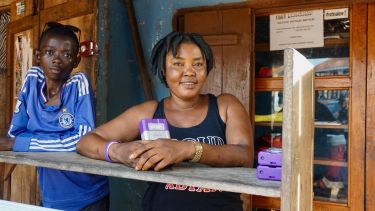Academics from the Energy Institute tested a range of variables to maximize the value of Mobile Power’s clean energy chargers and help provide better quality clean energy to customers in West Africa.
Professor Dan Gladwin and his team have helped local Sheffield business Mobile Power to improve their smart battery packs which provide cheap, sustainable energy to people in low-income communities in West Africa and other developing countries.
Mobile Power use a pay-per-charge rental model to supply smart battery packs to small businesses and individuals in the communities they serve. The batteries are charged at solar charging stations before being delivered to customers, thereby removing the need for dangerous traditional diesel generators and reducing energy costs by up to 75%.
However, Mobile Power wanted to be sure they were supplying the best quality, long-lasting and cheapest energy services to their customers, who come from underserved and off-grid parts of West Africa and beyond. To do that, they needed to test their battery cells to ensure they were operating at the best possible level.
Getting started
Professor Dan Gladwin began a partnership with Mobile Power in 2017. For this project, Mobile Power asked the team to investigate how different charging strategies impacted the lifetime of the lithium-ion cells which the battery packs use. The testing needed to include the fact that West Africa – where many of the Mobile Power hubs are based – has high temperatures which will require different ways of optimising the performance and charging strategy of the battery packs. The project also included testing which would help Mobile Power to effectively select the most appropriate battery cell manufacturer for their products.
The team were looking at how the lifetime of the battery differed with each variable, so that Mobile Power could choose those which worked best and make changes accordingly.
Professor Gladwin and the team began by identifying the three most important aspects of cell performance for Mobile Power’s application – energy stored, cycle life and charge speed – and developing a charge strategy to maximise each. Groups of battery cells were then subjected to repeated cycles of these strategies, all tested at 35°C to reflect the temperatures they would be working in. In all, each cell was subjected to up to 800 charge-discharge cycles over a period of several months.
As a result of the project, Mobile Power has been able to improve the expected lifecycle of their lithium-ion battery packs, and understand the implications of different ways of charging, and how that’s impacted by the high African temperature. The company has looked at the results of testing and made changes to their charge voltage, current cut-off point and thermal management parameters.
As for Mobile Power’s customers, they’ll now be able to receive more consistent energy on battery packs which will last longer. For Mobile Power, this not only means improving their commercial viability but also gives their current customers better and cheaper energy services, and allows them to continue to expand to bring cheap, affordable electricity to people in off-grid areas.
Next steps
The second phase of this project will focus on developing significantly larger lithium-ion battery packs that can both store energy as part of a mini-grid and will be ‘hot swappable’, meaning they can be rented out for household, transport and commercial use, such as to run fridges for medicines in hospitals, then returned back to the mini grid to be recharged.
Professor Dan Gladwin said: “These new battery packs can be swapped in or out of the micro-grid without shutting down the power system and are designed to maximise the life of the battery cells under different applications. They can one day be providing power to a whole village and the next day swapped out to drive the motor of an electric KeKes. For households where the cost of connection to the mini-grid is prohibitively high, these packs are easily carried to the home and are capable of powering multiple devices for long durations.“
The partnership between Mobile Power and the University will enable research into pack design and its docking/charging system to optimise charging speeds, cycle life of the battery packs and the management of the hot-swappable system.
Jono West, Founder and Chair at Mobile Power and Project Lead, said: “We are grateful for the partnership with Professor Dan Gladwin, particularly in his support and advice to date. We look forward to working closer together on this project.”
There are two other project partners involved: Winch Energy, a global, off-grid energy developer and technology integrator, and Pink Power, a local non-governmental organisation (NGO).
Through these two partners, the project will be conducting field trials at two sites in Sierra Leone. Firstly, at Winch Energy’s mini-grid in Sierra Leone, where women will be employed as energy entrepreneurs, renting out the batteries for household and micro-enterprise use. The second will be at Pink Power’s site in Freetown, where a trial will take place to power electric tuk-tuk’s with the battery packs. This will be part of Pink Power’s wider project on training up vulnerable women to drive the tuk-tuks as a form of employment.

